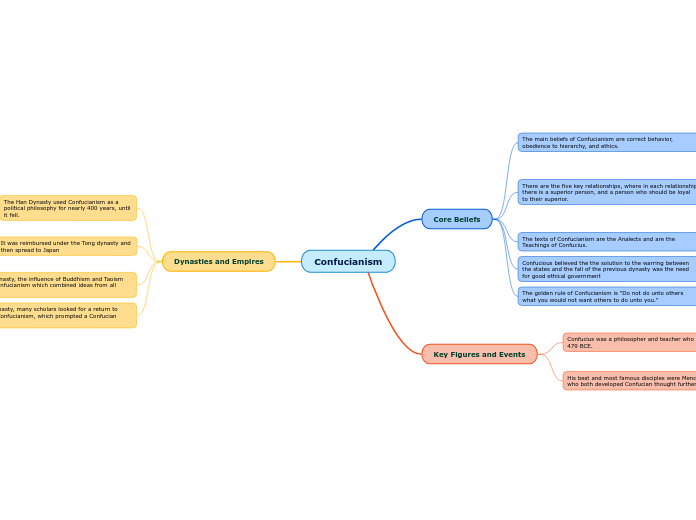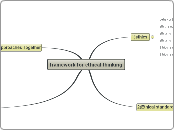Confucianism
Dynasties and Empires
In the Qing Dynasty, many scholars looked for a return to older ideas of Confucianism, which prompted a Confucian revival.
In the Song Dynasty, the influence of Buddhism and Taoism
created Neo-Confucianism which combined ideas from all three religions.
It was reimbursed under the Tong dynasty and
then spread to Japan
It also spread to Korea and Vietnam.
Japanese emperors tried to imitate the Chinese
bureacracy and ended up adopting Confucianism
The Han Dynasty used Confucianism as a
political philosophy for nearly 400 years, until
it fell.
Emperor Wu Di made Confucianism the official state ideology.
Confucian schools were established to teach
Confucian ethics.
Key Figures and Events
His best and most famous disciples were Mencius and Xunzi, who both developed Confucian thought further.
Confucius was a philosopher and teacher who lived from 551-479 BCE.
Confucius is more worshiped as a spirit, rather than a God.
His thoughts on ethics, good behavior, and moral character were written down by his disciples in several books (the most important being Lunyu).
Core Beliefs
The golden rule of Confucianism is "Do not do unto others what you would not want others to do unto you."
Confucious believed the the solution to the warring between the states and the fall of the previous dynasty was the need for good ethical government
The officials would gain power not because of their money, but because of their intelligence.
They would then have to pass the civil service exam.
The texts of Confucianism are the Analects and are the Teachings of Confucius.
It is more of a philosophy than a religion.
There are the five key relationships, where in each relationship there is a superior person, and a person who should be loyal to their superior.
The main idea is Filial Piety, which is the love an respect children should give to their parents and other elders in the family.
This emphasizes the Confucian belief of ancestor worship.
This involves obeying their wishes and taking care of them when they are old.
These five relationships are ruler to subject, husband to wife, parent to child, elder to younger, and friend to friend.
The main beliefs of Confucianism are correct behavior, obedience to hierarchy, and ethics.









